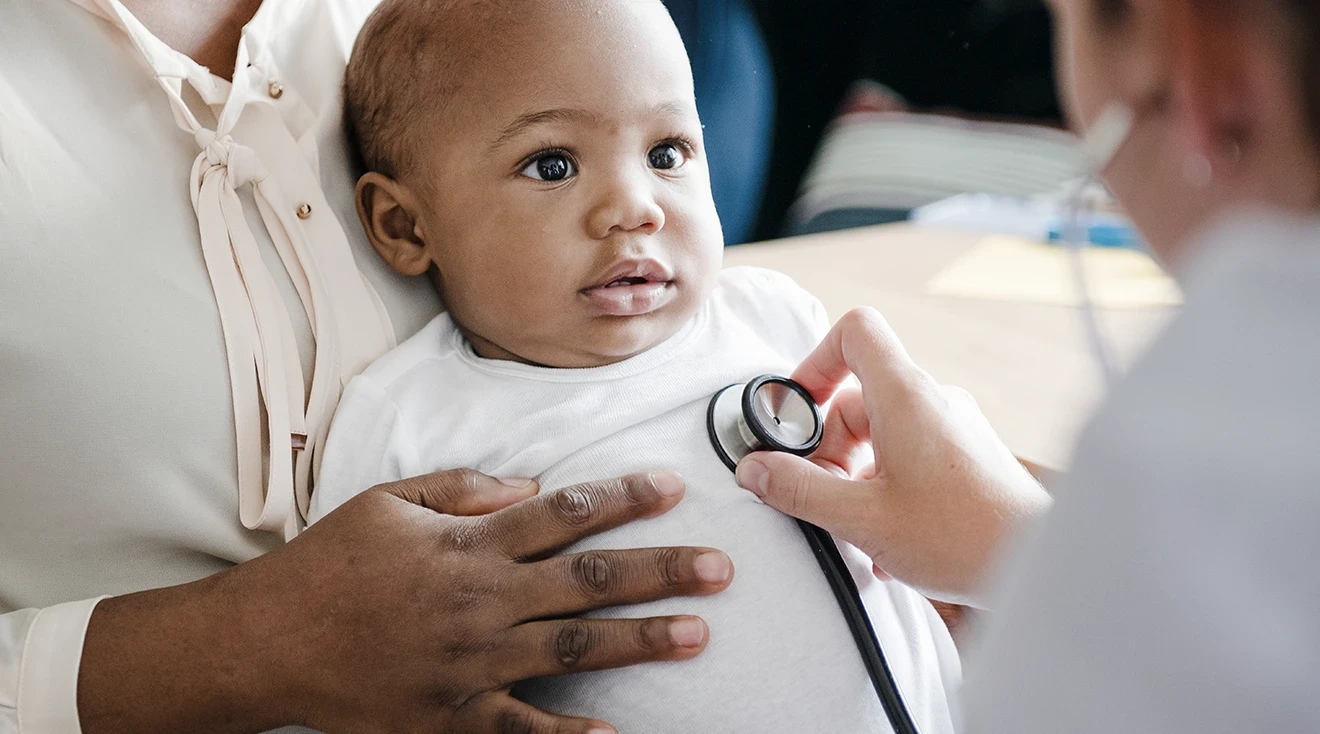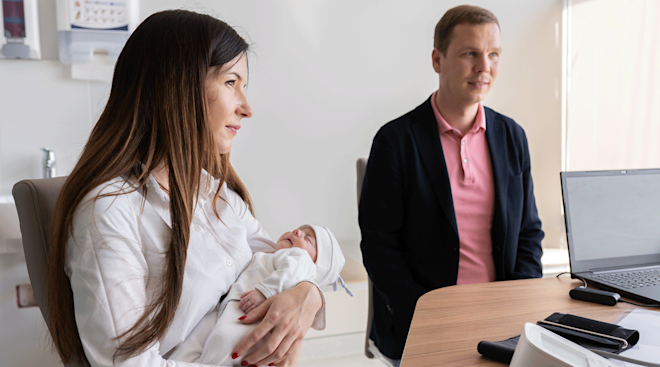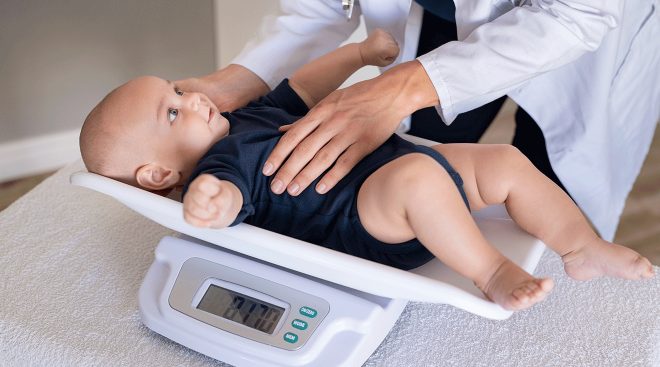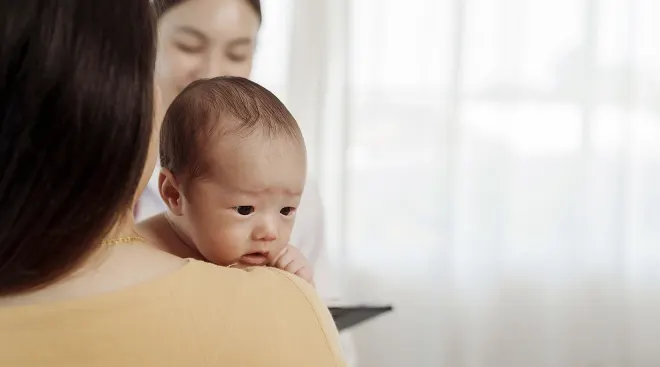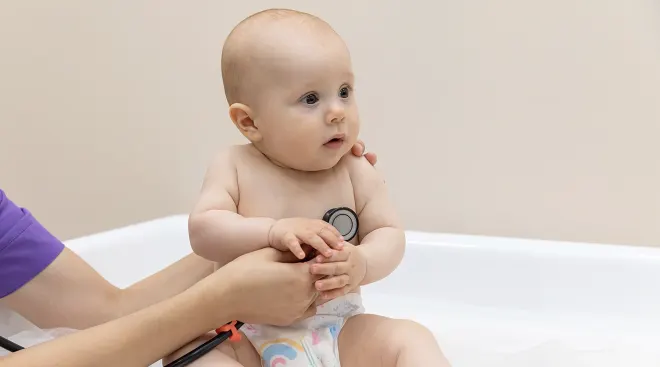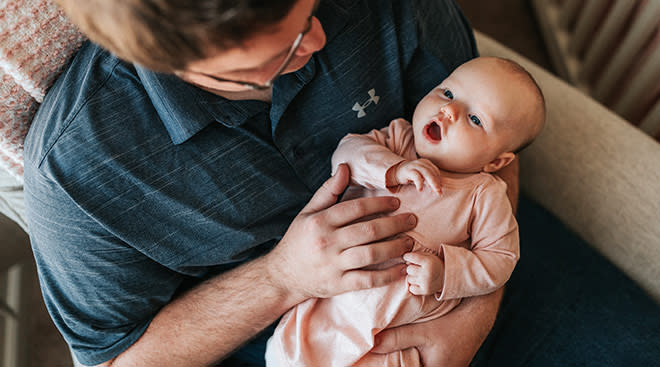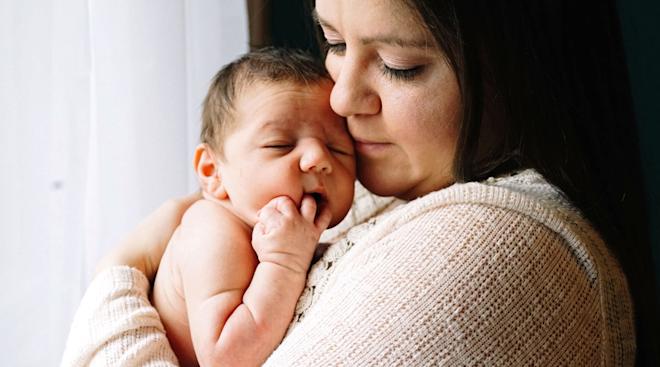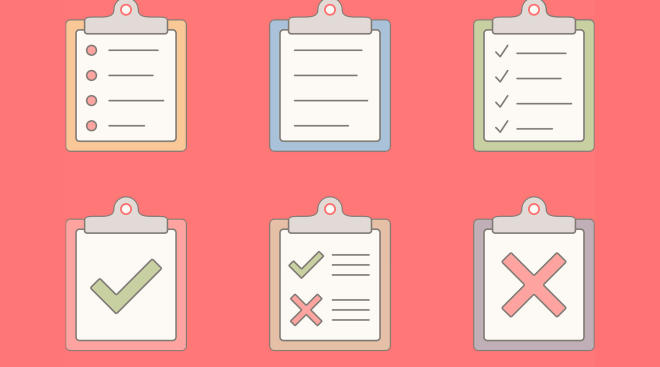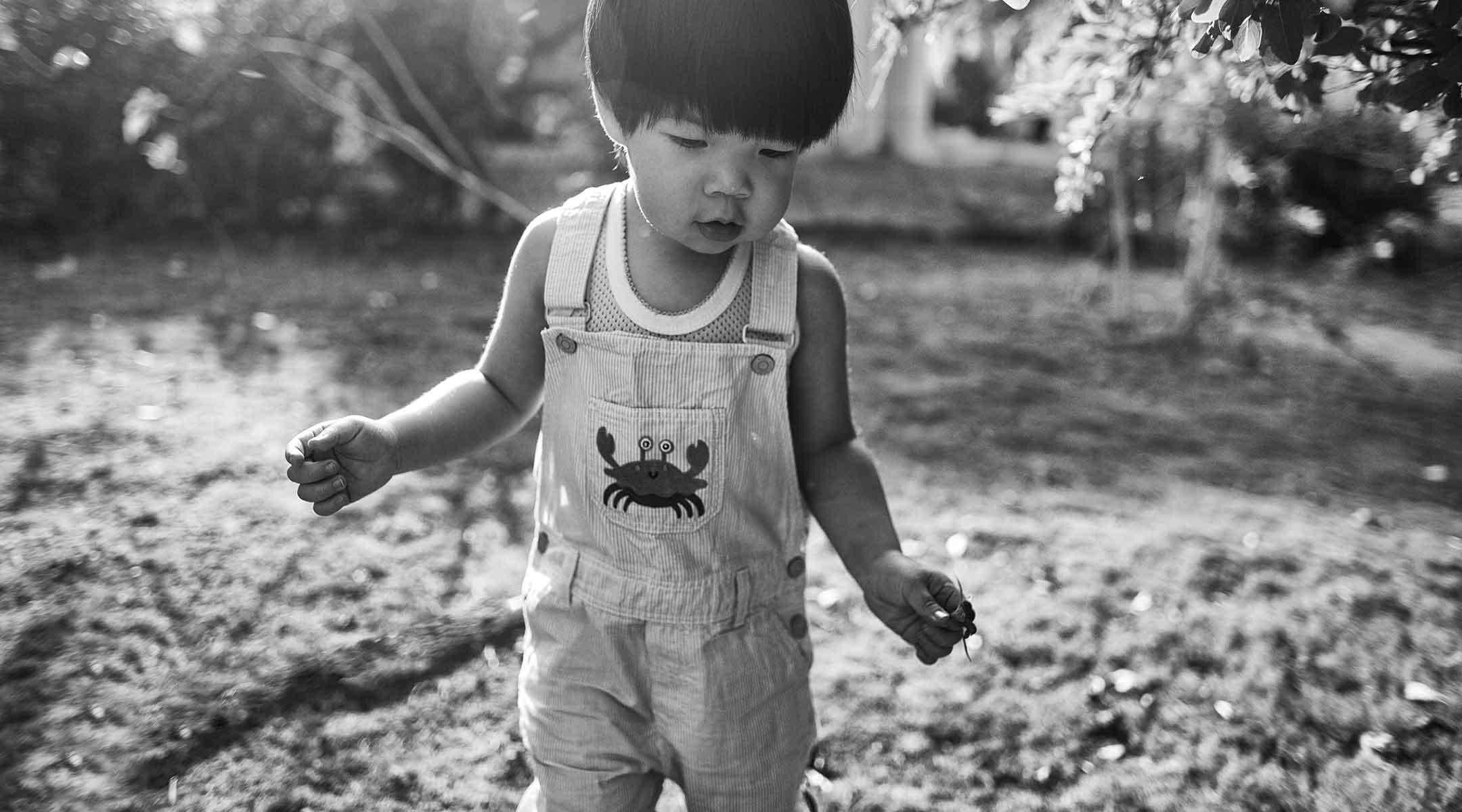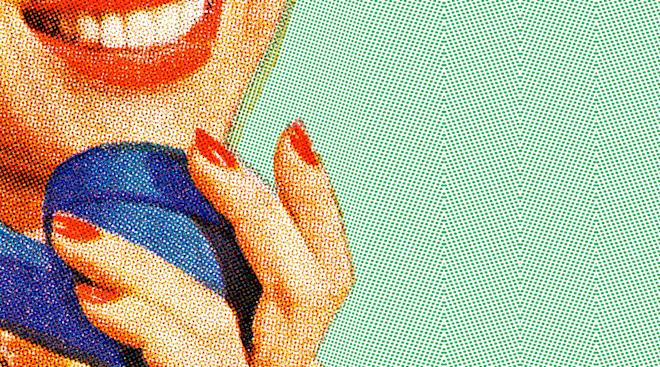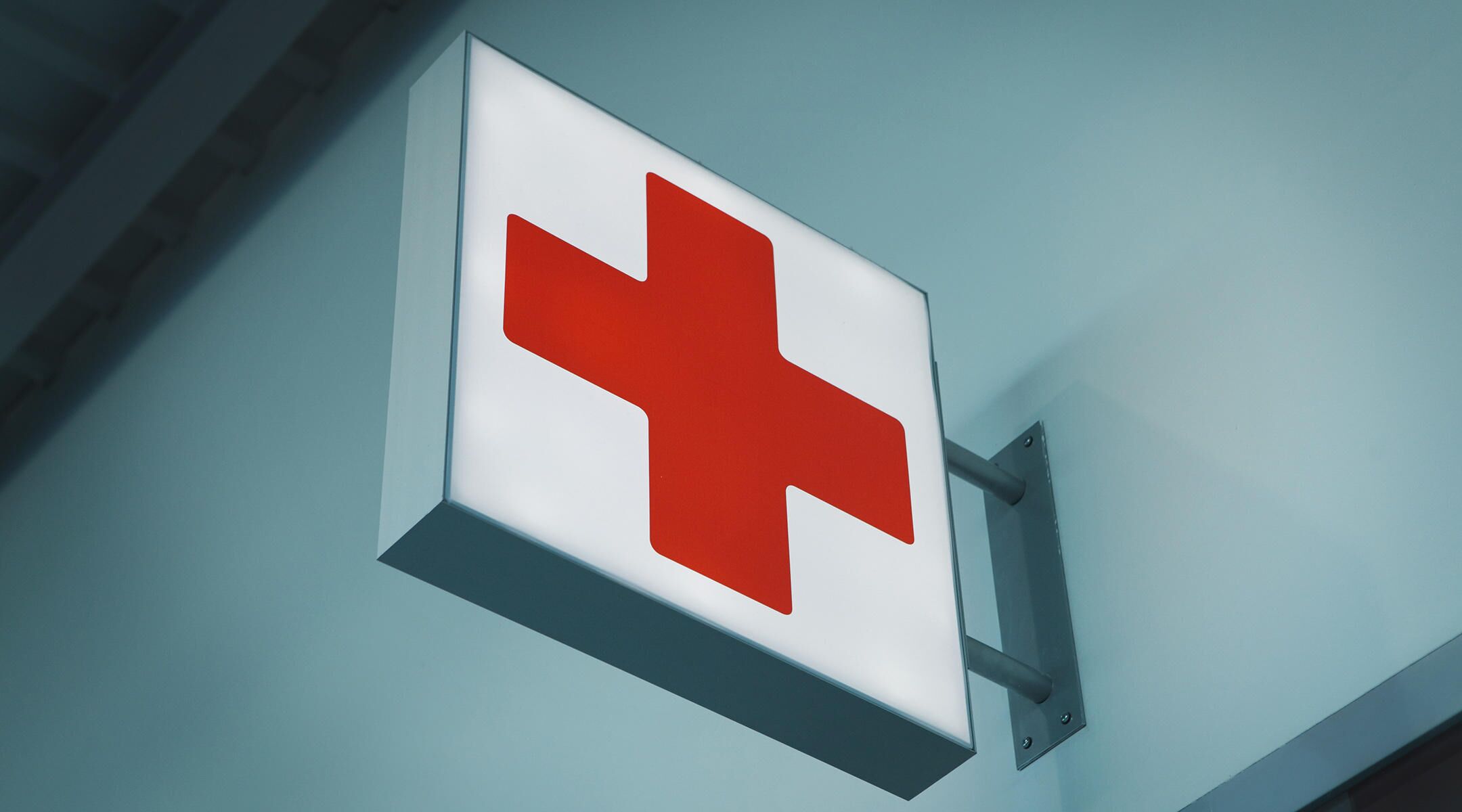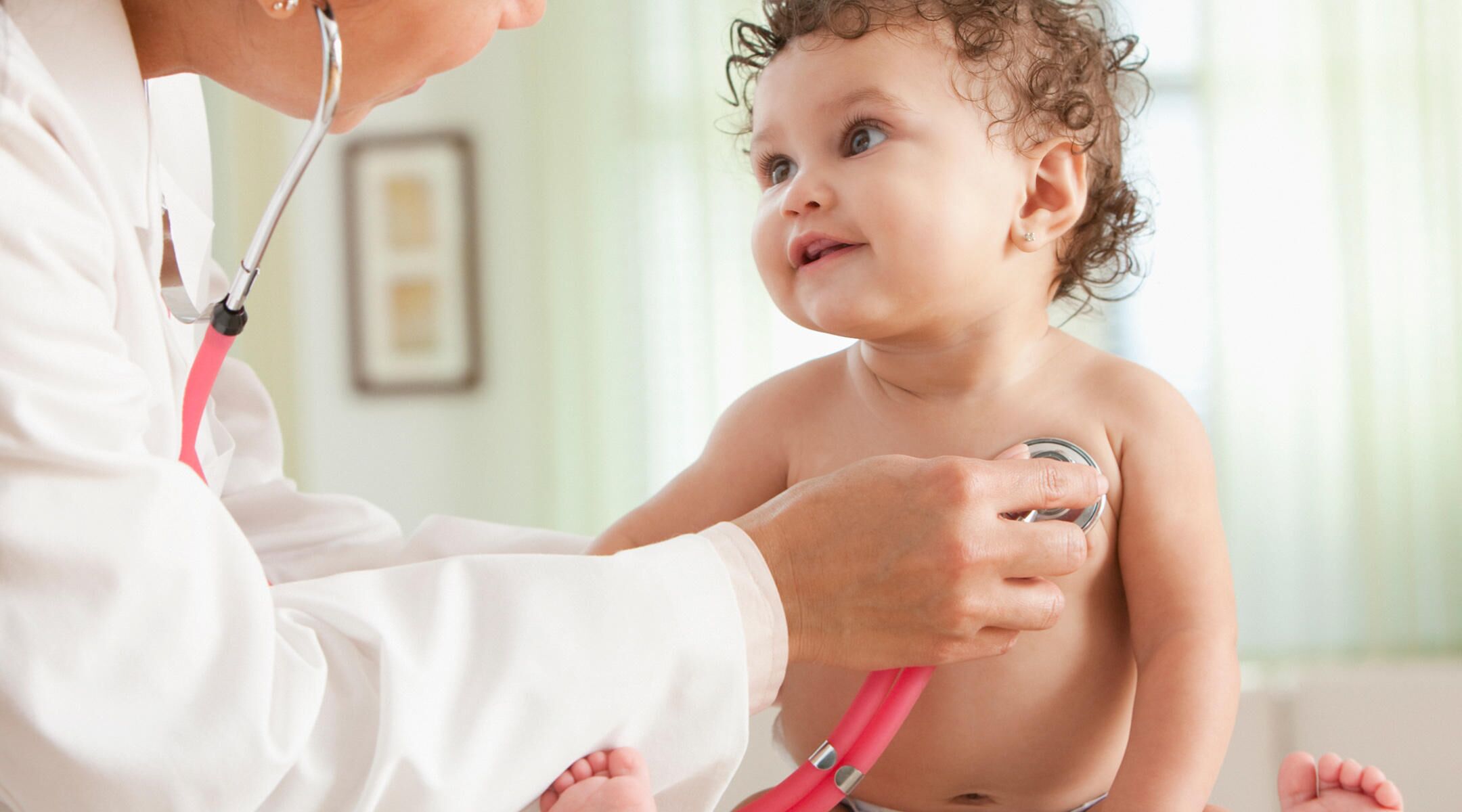What to Expect at Baby’s 6 Month Checkup
At 6 months old, baby is rapidly approaching new milestones, like rolling over in both directions, babbling, starting solids, laughing and sitting with support. Your little one may also be hungrier, fussier and experiencing sleeping setbacks at this age—these are all signs they’re going through a growth spurt. It’s an exciting stage of development, and your pediatrician will want to make sure everything’s on track at their six-month checkup. Wondering what to expect at this pediatrician’s visit? Here’s what to know about the six-month appointment and how to best prepare.
At the 6 month checkup, your pediatrician will do a thorough physical examination of baby to ensure their growth and development is on track, as well as ask you questions about their milestones, cognitive skills and motor development. Here’s what to expect:
Physical screenings at the 6 month checkup
During each of baby’s well visits, including the six-month checkup, your pediatrician will measure baby’s height, weight and their head circumference. They’ll then add these numbers to baby’s growth chart “to make sure your child is growing along their growth curve,” says Loretta Cody, MD, a board-certified pediatrician based in Connecticut.
In addition, your pediatrician will check the shape of baby’s head and soft spots to make sure they’re developing properly, says Preeti Parikh, MD, a pediatrician in New York City. They’ll also check baby’s reflexes, joints, genitals, eyes, ears, mouth, heart, stomach and lungs.
Cody adds that your pediatrician may also do a quick oral assessment, and see if any teeth are coming through.
Milestone assessment at 6 months
Babies grow pretty quickly at this age and are constantly working toward new achievements. Your pediatrician will “ask about all areas of development, including motor, language and social milestones that your child may have reached,” Cody says.
According to Cody, Parikh and the American Academy of Pediatrics (AAP), some questions to expect are:
- Is baby rolling over?
- Can baby sit up for short amounts of time?
- Do they sit up unassisted or does baby tripod (i.e. when they sit with their arms on the floor in front of them to stay balanced)?
- Does baby transfer objects between hands?
- Does baby babble and try to respond when you talk to them?
- Does baby make identifiable consonant sounds?
- What does baby’s daily schedule look like?
- Do you read to baby? How often and how much?
- What type of books do you read to baby?
- How are any older siblings adjusting to baby?
- How is the entire family doing overall?
Don’t be surprised if your pediatrician has baby do some of these things in front of them and observe. “There’s nothing better at a checkup as a pediatrician than to hand an object to a 6-month-old and watch them transfer it to their other hand,” Cody says. “Development is wonderful!”
Nutrition check-in at the 6 month checkup
By 6 months, your little cutie is probably experiencing their first tastes of solid foods. Though their primary source of nutrition should still be breast milk or formula, slowly introducing soft, mashable solid foods can help them become acquainted with different tastes. Parikh recommends starting with one pureed food a day and sticking with firsts like baby cereal, cut up fruits and mashed vegetables. If you do try something new, do it early in the day so you can watch for a reaction and have time throughout the day to call the doctor should baby get sick or experience a reaction, she adds.
According to Parikh and Lauren Crosby, MD, FAAP, a pediatrician based in Beverly Hills, some questions your pediatrician may ask include:
- Has baby started teething yet?
- If those first teeth have erupted, have you started brushing baby’s teeth yet?
- Have you started introducing solids into baby’s diet? What kinds and how many times a day?
- Has baby had a negative reaction to any foods?
- Has baby started to drink water yet?
- Has baby been introduced to a sippy cup?
- How many dirty diapers does baby have every day?
- What are baby’s daily bowel movements like? Are they consistent, or do they change regularly?
Sleep check-in at the 6 month checkup
By 6 months old, baby may have already started sleeping through the night, or they may be well on their way to learning how to put themselves back to sleep in the event that they do wake. To get a sense of how baby’s sleep habits are developing, the AAP notes your pediatrician may ask:
- Is baby still waking for nighttime feedings?
- Is baby sleeping through the night?
- In the event that baby does wake up at night, how do you handle it? Do you go to them immediately or give them a few minutes?
- Is baby able to put themselves back to sleep without help?
- Where does baby sleep and what is their sleeping environment like? Is it consistent?
- Do you use a white noise machine to help baby sleep?
- Do you put a bottle in the crib with baby? (The AAP advises against this, as it could result in tooth decay)
- Do you put baby to bed when they’re drowsy but awake or when they’re already asleep?
- How many hours of sleep does baby get each night?
- What does baby’s daily nap schedule look like?
Child safety check-in at the 6 month checkup
With baby gaining so many motor skills and learning how to move around, you’ll want to make sure your home is properly childproofed, Parikh notes. Your pediatrician will ask you about childproofing and other aspects of baby’s safety. Here are some safety questions to expect from your pediatrician, according to the AAP:
- Have you already started to babyproof your home?
- Do you have a gate for any pools or large bodies of water?
- Do you know what to do in a choking emergency for baby now that they’re starting solids?
- Do you know the signs of an allergic reaction or anaphylaxis, and do you know what to do?
- Do you know infant CPR?
- Do you have any questions about cutting up food for baby and what kind of solids they can eat?
- If your baby has a fever, do you know the proper dosage of medicine?
Postpartum checkup and screening
It may be baby’s 6 month checkup, but your pediatrician will likely want to check in with you too, Cody says. She notes that pediatricians usually conduct an Edinburgh Postnatal Depression Screening (EPDS) for Mom at this well-visit to screen for any signs of postpartum depression. She also encourages parents be honest about how they’re feeling and how parenting is going—after all, your pediatrician is also there to help you. The AAP notes some questions they may ask you include:
- How are you feeling?
- How are you and your partner adjusting to parenting?
- Are you and your partner experiencing any postpartum issues?
- Are you experiencing any issues with breastfeeding?
- Are either of you experiencing any anxiety or sadness?
- How do you and your partner bond with baby?
Babies receive many immunizations during their first few years of life—including at their six-month checkup. Your pediatrician will probably give baby their shots toward the end of the appointment, and they’ll likely be the next doses of the same shots baby received at the two- and four-month checkups, Parikh says. It’s important to know that because there’s an age range for immunizations, which specific shots and how many baby receives at each checkup will depend on your pediatrician’s office. Some of the vaccines may also be given in a combined form, Cody adds. Some vaccines you can expect baby to get at the six-month appointment include:
- PCV (Pneumococcal vaccine)
- DTaP (Diphtheria , tetanus, acellular pertussis)
- Hib (Haemophilus influenza type b)
- Hepatitis B
- Rotavirus (Baby will receive two or three doses, depending on whether they get the Rotarix or RotaTeq vaccine)
- IPV (Inactivated polio vaccine)
Six months old is also the youngest age baby can receive the flu shot and COVID-19 vaccine, Cody notes. So if it’s cold and flu season, your pediatrician may also recommend giving baby both of those vaccines as well. They may also suggest giving the MMR (measles, mumps and rubella) vaccine early (after 6 months instead of 12) if baby is traveling abroad.
Never hesitate to bring any and all questions you have at each of baby’s well visits. In fact, writing down questions or thoughts in your phone or a journal can help ensure you don’t miss anything while you’re at the appointment. Crosby and Cody encourage parents to ask about anything and everything relating to baby’s development. Below, some potential questions to ask:
- What kinds of solid foods should be included in baby’s diet?
- What should the consistency of baby’s food be at this age?
- What can I do if baby’s resistant to trying new foods?
- How many solid foods should baby eat daily?
- What should other caregivers know about feeding baby, now that they’re starting solids?
- When can I give baby highly allergenic foods?
- How should I be taking care of baby’s dental health?
- When can baby have water?
- When should baby start using a sippy cup?
- What sunscreen should I be using on baby?
- What’s the best way to treat a diaper rash?
- How can I help baby’s language development? (Both the AAP and Crosby say daily reading is great for this!)
- How can I protect baby from cold and flu viruses, RSV and other respiratory infections?
In addition to any questions you have around baby’s growth, safety and development, Cody and Crosby also say to look out for and discuss any potential red flags. For a 6-month-old, these can include:
- If baby isn’t rolling over in both directions (back to front and front to back)
- If baby doesn’t lift their head while keeping their arms straight during tummy time
- If baby isn’t trying to use their hands to support themselves while sitting up
- If baby isn’t bringing items to their mouth
- If baby isn’t transferring objects from one hand to the other
- If baby doesn’t reach for or grab objects
- If baby isn’t making “squealing” sounds and blowing raspberries
- If baby has regressed in their development in any way
- If baby has had no social interaction
Crosby notes that around 6 months is when babies start to develop anxiety and fear around strangers. “They may be more upset at seeing new and unfamiliar faces,” she notes, which may make the six-month appointment a little more difficult. She recommends parents bring anything that helps soothe baby, including pacifiers, favorite toys and bottles for feeding. You’ll also want to bring an extra outfit, wipes and diapers in case baby needs to be changed while waiting for their appointment.
Wondering when baby’s next well visit will be? Crosby says it’ll be at 9 months old.
Please note: The Bump and the materials and information it contains are not intended to, and do not constitute, medical or other health advice or diagnosis and should not be used as such. You should always consult with a qualified physician or health professional about your specific circumstances.
Plus, more from The Bump:
Loretta Cody, MD, is a board-certified pediatrician based out of Connecticut. She received her medical degree from New York Medical College and completed her residency at Yale New Haven Children’s Hospital.
Lauren Crosby, MD, FAAP, is a pediatrician with La Peer Pediatrics in Beverly Hills, California, as well as a mom of two. She earned her medical degree from UCLA School of Medicine and completed her residency at Cedars-Sinai Medical Center. She currently serves as an official spokesperson for the American Academy of Pediatrics.
Preeti Parikh, MD, is a pediatrician with Westside Pediatrics, located in New York City, as well as a spokesperson for the American Academy of Pediatrics. She earned her medical degree from Rutgers University and completed her pediatric residency at Mount Sinai Hospital.
Healthy Children (American Academy of Pediatrics), Checkup Checklist: 6 Months Old), February 2023
Learn how we ensure the accuracy of our content through our editorial and medical review process.
Navigate forward to interact with the calendar and select a date. Press the question mark key to get the keyboard shortcuts for changing dates.

































